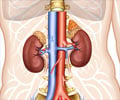Family members of children who have been diagnosed with cancer are also at risk of developing the condition if a family history of cancer exists.

The research team found that when children were diagnosed with any kind of cancer at age 18 or younger, the risk to their parents, siblings, or children for childhood cancer doubled compared to families with no childhood cancer patients. If the cancer diagnosis came when the child was age 4 or less, the risk to close relatives for childhood cancer increased almost four times.
"No one had previously studied the question, so we simply told parents there was no evidence of increased risk to the other children," said Schiffman. "Now we can give an evidence-based answer—the risk depends on your family history of cancer."
This is the first study that uses the Utah Population Database (UPDB) to broadly examine the risk of all types of cancer in relatives of children with cancer. This unique resource at the University of Utah links genealogies and cancer registry data from Utah to medical records and vital records, including Utah death certificates.
"Because our data came from the UPDB, the assessment of family history in our study does not rely on self- or family-reported medical history," said lead author Karen Curtin, Ph.D., a genetic epidemiologist and UPDB assistant director. "Self-reporting of family medical history depends on an individual's memory, while our data comes from the statewide Utah Cancer Registry that records nearly all cancer cases, which reduces possible errors in reporting family cancers."
The team also assessed known inherited genetic syndromes in adult relatives of pediatric cancer patients. They found cancers associated with Li-Fraumeni Syndrome (LFS) seemed to be driving the increased risk to relatives in families with a history of cancer.
Advertisement
"LFS is one of the most devastating cancer syndromes," said Schiffman. "It causes a variety of cancers in both children and adults. For people with LFS, the lifetime risk of getting cancer is 80% to 90%, but with increased and early screening for tumors, there's early indication of a very high survival rate, perhaps even approaching100%. In a previous study, LFS patients who did not receive early screening only had a 20% survival rate."
Advertisement
"We want to encourage the taking of a family history as part of routine care. With all cancers, but perhaps especially with childhood cancers, so many other questions seem so urgent, a family history may not seem to be the most pressing issue," said co-author Wendy Kohlmann, director of HCI's Genetic Counseling Program. "When families are referred into genetic counseling, we can provide them with more information about the risks and actions they can take."
"For families with previously unidentified LFS, following these recommendations could actually save the lives of multiple family members if at risk individuals are identified and early cancer surveillance programs implemented," Schiffman said.
The data analyzed in this study indicated that outcomes for pediatric cancer patients are worse in families with a history of cancer. Schiffman said that further studies are planned to learn the clinical implications of this observation.
Source-Eurekalert













